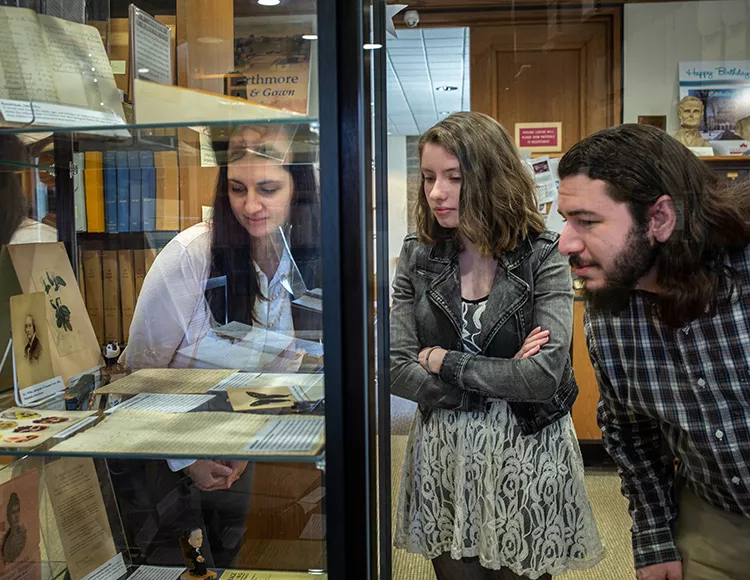Update (3/29/19): Yesterday, the National Endowment for the Humanities (NEH) announced its 2019 cycle awards, including funding for two Swarthmore projects. The Peace Collection will receive over $325,000 for a three-year grant to digitize sound and visual recordings on women, peace, and social justice in the 20th century, including Jeannette Rankin, Jane Addams, and Coretta Scott King. The In Her Own Word project received nearly $350,000 for the next phase of its project (administered by the Historical Society of Pennsylvania). Among other things, this funding will be used to enhance the website at inherownright.org and allow the Friends Historical Library to digitize two additional collections.
Tucked in a corner of the Friends Historical Library are three of the world’s foremost experts on the abolitionist firebrand Abigail Hopper Gibbons.
“They’ve read her entire life story, every letter she wrote,” archivist Celia Caust-Ellenbogen ’09 says of digitization technicians Brigitte Burger, Chloe Lucchesi-Malone, and James Truitt, who are digitizing the documents of activists in the lead-up to women’s suffrage for the In Her Own Right project.
“It’s sort of like having a pen pal,” adds Lucchesi-Malone, “except they’re long dead.”
In Her Own Right is one of three grant-funded digitization projects in progress at the Friends Historical Library and the Peace Collection. Spearheaded by the Philadelphia Area Consortium of Special Collections Libraries (PACSCL), with Swarthmore serving as a co-principal investigator, the project brings roughly a dozen special collections libraries together to digitize and aggregate a trove of stories now available in archives but not shared widely. The goals: to help researchers find and put pieces together, and to deepen our understanding of women’s activism.
“It wasn’t just white middle-class women marching for suffrage,” says Caust-Ellenbogen, noting the array of women of different races, classes, and backgrounds working for causes as diverse as abolitionism, prison reform, professional recognition, education, and more.
“I’ve enjoyed the activist angle of this,” adds Truitt. “It’s a thrill to see people putting their values so strongly into action.”

Digitization technicians Brigitte Burger, Chloe Lucchesi-Malone, and James Truitt have already scanned more than 30,000 pages of manuscripts, diaries, and organizational records.
Supported by the Council on Library and Information Resources (CLIR), these digitization efforts have kept the three techs busy since June. They have already scanned more than 30,000 pages of manuscripts, diaries, and organizational records. Now, they are carefully cataloging the items, writing descriptions and transcriptions, and assigning computer-readable locations, dates, and other pieces of data. This will allow researchers to sort and sift through the huge body of material from more than a dozen libraries generated during this project. Swarthmore received a small grant from the Gladys Krieble Delmas Foundation to support the infrastructure of the aggregator site.
Abounding are connections to Swarthmore (such as speeches and sermons from Lucretia Mott, one of the College’s founders, whose collection is now being comprehensively digitized), and to Quaker women and organizations more broadly. The latter aspect drew Burger, a Quaker, to the effort, which has exceeded her expectations.
“It’s such an exciting aspect of the project to come in and learn new things every day,” she says.
Similar opportunities are available in the Peace Collection, which received a grant from the Samuel Rubin Foundation to digitize and disseminate VHS recordings and audio cassettes from the anti-nuclear proliferation movement from the 1960s onward.
“We’re excited not only to preserve these recordings but to hear the voices and see the people who made a difference in that movement,” says Wendy Chmielewski, George Cooley Curator of the Peace Collection, “especially at this moment, with nuclear threats back in the news and on people’s minds.”
That effort follows another grant last year, from the Recordings at Risk program at CLIR. With support from the Mellon Foundation, the Peace Collection digitized magnetic recordings from the Vietnam War era. Peace Collection staff have so far digitized more than 200 recordings on film and reel-to-reel tape from all angles of the war—the sound recordings and visual/film recordings can be found on the Internet Archive. These recordings include former Secretary of State John Kerry testifying before Congress about his wartime experiences in Vietnam, singer and civil rights activist Harry Belafonte and U.S. Rep. Ron Dellums discussing the costs of the military budget on poor American communities, as well as the voices of ordinary men and women who resisted the Vietnam War.
For many of these recordings, the Peace Collection no longer had equipment on which patrons and researchers could view them. Other recordings were themselves deteriorating.
“Some of them are the only existing copies in the world,” Chmielewski adds, “and no one had watched them for a very long time.”
“Even with these grants, less than 10 percent of Peace Collection recordings have been digitized,” she says. “We have so many wonderful recordings that need to be preserved and made accessible to the world.”
For more on In Her Own Right, visit the pop-up exhibit in the Friends Historical Library, which runs through March to celebrate Women’s History Month.
To learn more about how Swarthmore is investing in its vibrant intellectual culture, visit lifechanging.swarthmore.edu.



